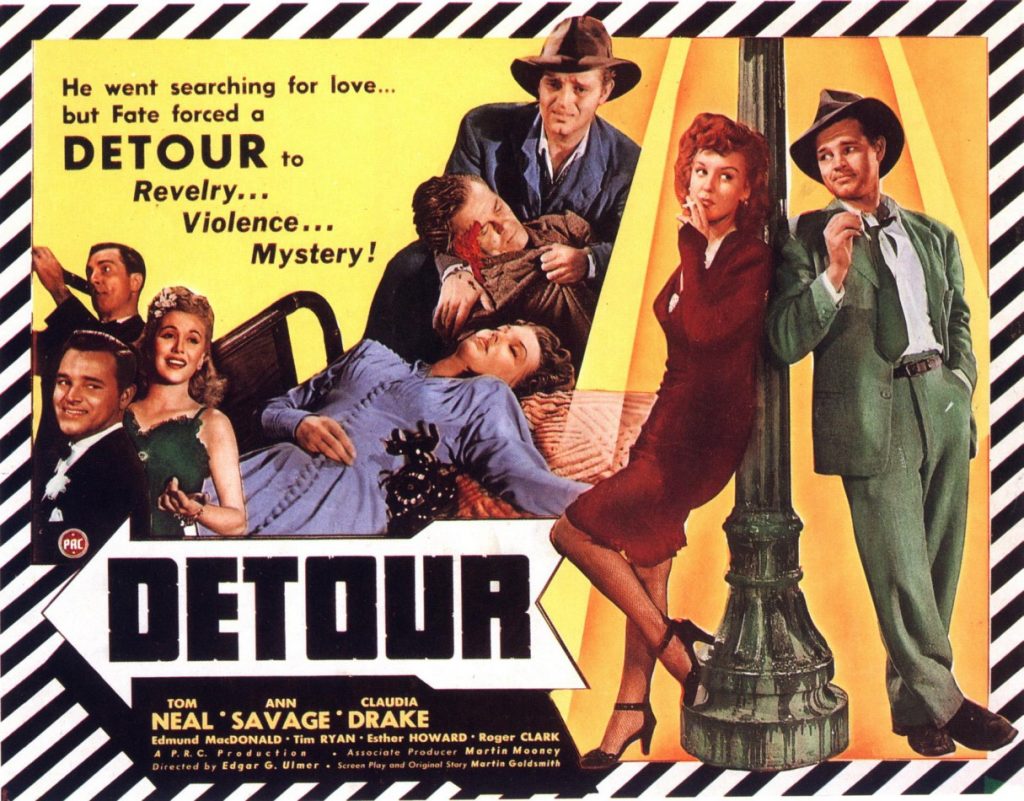
According to cinema lore, Edgar G. Ulmer’s Detour, a slapdash, unprofessional $20,000 melodrama shot in a mere mistake-filled six days, has somehow, over the past 66 years, accrued a sizable and appreciative following among film noir enthusiasts. Except it turns out that, in reality, its budget probably ran to some $117,000. And those six days might have actually been three six-day weeks. And the Austrian-born Ulmer, who had not only worked for such European luminaries as F.W. Murnau, Billy Wilder, and (so he claimed) Fritz Lang, but even made The Black Cat for Universal Pictures, hardly lacked professional bona fides. And the film’s careful use of sound and striking use of light set it apart even from its brethren in the genre.
And speaking of that genre, a hearty critical agreement now holds that Detour distills, in its brief 68 minutes, the most vital emotional and aesthetic elements of film noir in a way that none of its other exemplars have managed. And mistakes? What mistakes? As Roger Ebert wrote on ushering the film into his Great Movies canon, “Placing style above common sense is completely consistent with Ulmer’s approach throughout the film.”
To recount Detour’s story here — a piano-player down on his luck; a sudden death; a scheming, venomous dame — would be to miss the point. To cite out its many, er, unconventional production choices — nonexistent backgrounds concealed with fog, shots simply flipped over and re-used, stock footage meant to pad the runtime almost to feature length, unconvincing rear projection even by 1945’s standards — would be to miss the point from another direction. The film has fallen into the public domain, so watch it free online and experience for yourself the way that, for all its apparent bluntness, it stealthily lodges itself in your sense memory. To call a movie “dreamlike” reeks of cliché, but Detour presents the elements of film noir in such a pure, naked state that you have little choice but to accept them directly, the way you would accept the “facts” of a dream. Though seemingly incompetent on all the levels subject to conscious analysis, the film operates effectively on all the levels beneath, hence the lasting inspiration it offers to certain filmmakers today. Make Detour, if you can, a double-feature with David Lynch’s Lost Highway, which plays almost like a straight tribute to Ulmer’s picture. As a dedicated transcendental meditator with a fascination for the dark side of Los Angeles and a tendency to bend archetypal characters toward his often oblique but always vivid stylistic will, Lynch has internalized Detour’s legacy — intended or otherwise — more deeply than any other filmmaker alive today.
More noir classics can be found in our collection of 60+ Free Noir Films.
Colin Marshall hosts and produces Notebook on Cities and Culture. Follow him on Twitter at @colinmarshall.


Any opinions on “kiss me deadly”
Had not seen this till 2013. Great style but let down by poor script and incoherent dialogue.
I love Kiss Me Deadly. I even bought the blu-ray. I like how the main actor is such a dick. And it has a raunchy feeling for such an old film. The whole premise is bizarre. I would recommend that movie to anyone.
The ‘flipped’ negatives can be seen at approximately 14:30, when he first starts hitch-hiking (notice that suddenly cars’ steering wheels are on the right, and they’re driving on the left side of the road!)nAnother nice touch at approximately 39:00; Vera’s windblown hair looks like devil horns, just when her true evil side comes out. If this is a coincidence, it’s a very fortunate one.nAnd no one can bark “Shut up!” quite like Ann Savage.
Love “Kiss Me Deadly”–it’s so strange because it looks like it was definitely influenced by European film—and yeah, it was very violent (for its time) and strange as heck–and definitely before its time–which is why it’s so fun and fascinating to watch. It’s like watching a 1960s flick made in 1955—sweet!
Love the title of this article, because it’s funny as heck,too! “The cheap,rushed piece of film noir nobody ever forgets.” They sure haven’t, thanks to film noir nuts like us!Ha ha ha ha ha! Love it!
“Détour” is, quite possibly, one of the best films noir ever. After the silly flipped car footage to match the right to left map stuff, it settles down into a great, over the top character study. The script is actually fantastic, with some brilliant lines. The camera work is spot on, never looking like camera work. Sure, some of the rear projection is less than stellar, but the acting fits the story and tone and, unlike “Double Indemnity” which I think is the Emperor’s New Clothes of films noir, the characters sound real in their world.
I can’t get enough of Ann Savage in this film. That she enters so late in the movie which then takes a surprising direction as she wakes in the car after being given a ride is fantastic. It takes off to 90 miles per hour as you take in the crazy plot. Yes, the story a long shot and not entirely believable but still very effective (More believable than Tom Neal playing the piano). Savage should have gone down as a top memorable villainess in movies for this role. She’s almost comical but so nasty and mean with her facial movements and glaring eyes. Only after watching this movie twice do you appreciate her first scene of walking up to the car. My all-time favorite Noir. No meandering in this film.